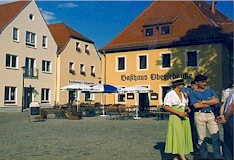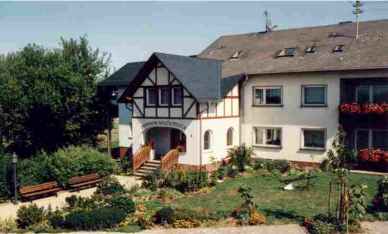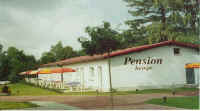11.19 Tourist accommodation
Hotels
Prices and standards in German hotels vary enormously. You can stay overnight in luxury suites, rooms in middle class hotels or very inexpensive accommodation in smaller hotels. Whilst it is true as a general principle that hotels are cheaper in rural areas and on the outskirts of cities than in city centres, a more reliable guide to what you can expect to find and pay is the German hotel classification system. This was introduced by the German Hotel and Restaurant Association (DEHOGA) in 1996. Hotels are classified based on a uniform criteria and are categorized by a certain number of stars - five stars is the best that a hotel (or other accommodation facility) can achieve. Click here for details of the mininum criteria for each of the star categories.
Some of Germany's most luxurious hotels are the Accor, ArabellaSheraton, Hilton, Inter-Continental, Kempinski, Marriott, Radisson, Romantik and Steigenberger.
 |
| A German hotel room |
|
When you arrive in a German town or city, the local tourist office (das Fremdenverkehrsbüro) - will usually be able to help you find a hotel that meets your requirements. If the tourist office is not open, there may well be a list of rooms on display outside the office with prices and other details. At airports and railway stations, you will often find a counter with a sign saying Zimmernachweis (= accommodation service) where you can book a room.
It is becoming easier and easier however to book hotel rooms via the Internet. See the web links at the bottom of this page for a number of hotel reservation services and hotel search engines which can enable you you to book your ideal accommodation from the comfort of your own desk!
Rooms in other types of accommodation
As a general rule, prices in a German guest house (die Pension) or a bed and breakfast (das Hotel garni) will be cheaper than in a hotel, but in high season guest house prices in tourist areas can still be quite high.
Look out for country inns (der Gasthof) that offer rooms. Many of them have their own butcher's and offer a wide variety of local specialities.
 |
| A typical German Gasthaus |
|
Holiday flats (die Ferienwohnung), holiday homes (das Ferienhaus) and holiday villages (das Feriendorf) are gaining in popularity as a low-price vacation option.
With environmental awareness in German-speaking countries being high, holidays on farms (Ferien auf dem Bauernhof) or in other "green" locations (such as stables or vineyards) are very popular. The German Agricultural Society (DLG) provides a comprehensive list of such approved holiday locations.
 |
| A holiday farm in Germany |
|
Youth hostels
Germany's 608 youth hostels are used not only by students, youth groups and school parties but also by hikers and tourists of all ages who seek an informal environment where you can meet people from a wide range of backgrounds. Most youth hostels are also suitable for families, offer sports facilities on their grounds and are wheelchair-accessible.
 The only requirement is that one must be a member of the German Youth Hostel Association (DJH). You may purchase a membership card directly from the German Youth Hostel Association or in the youth hostels themselves. The only requirement is that one must be a member of the German Youth Hostel Association (DJH). You may purchase a membership card directly from the German Youth Hostel Association or in the youth hostels themselves.
 So-called "Friends of Nature hostels" (das Naturfreundehaus) exist in locations of natural beauty such as mountain regions or walking areas. Many of them are youth guest houses or hiking centres, but it is possible for tourists, travellers and families to stay overnight. There are 500 such hostels in Germany alone and they range from simple boathouses and self-catering accommodation to recognised education centres. In mountainous areas you may also find a mountain hut (die Berghütte) that is willing to put up passing travellers for the night. So-called "Friends of Nature hostels" (das Naturfreundehaus) exist in locations of natural beauty such as mountain regions or walking areas. Many of them are youth guest houses or hiking centres, but it is possible for tourists, travellers and families to stay overnight. There are 500 such hostels in Germany alone and they range from simple boathouses and self-catering accommodation to recognised education centres. In mountainous areas you may also find a mountain hut (die Berghütte) that is willing to put up passing travellers for the night.
Tourist boards
Your first port of call when trying to find out more about accommodation and/or holidays in Germany should be the English homepage of the German National Tourist Board (GNTB). In addition to their excellent service for tourists, the sixteen German Länder have their own tourist boards which can be reached by clicking on the links in the following table:
 |
| A German Pension |
|
 |
Web Links |
 |
| Web sites on tourism in Germany |
 |
Germany-Tourism |
An English-language site offering information on all aspects of visiting and staying in Germany. |
 |
German Hotel Guide |
The German Hotel Guide has over 10,000 accommodations listed in its database! In English and German. |
 |
Hotel Association Germany |
The web site of the Hotel Association Germany (IHA) enables you to choose from a large number of hotels and book your stay online. In German and English. |
 |
Hotel Reservation Service (HRS) |
Book a hotel in Germany online without having to go through an agency. |
 |
Leithammel.de |
Leithammel.de is Germany's fastest hotel search engine. |
 |
Pension.de |
Search for a guest house in a German destination of your choice with this website. In German only. |
 |
Bed and Breakfast |
Book bed and breakfast accommodation in the region of your choice via this site. In English and German. |
 |
Bed and Breakfast Ring |
Looking for bed and breakfast accommodation in Germany? This website explains about options and availability. In English and German. |
 |
German Youth Hostel Association |
The homepage of the German Youth Hostel Association gives you information about the 600+ youth hostels in Germany. |
 |
Camp sites in Germany |
Use this site to locate German camp sites in a chosen location and see whether these sites have the facilities that you require for your stay. In German and English. |
 |
Deutscher Camping Club |
The German Camping Club is the largest organisation in Germany for caravanners and campers. In German only. |
 |
Farm and Home Stays |
Vacations on farms, in vineyards or in the saddle approved by the German Agricultural Society (DLG). |
|
 Chapter 11.20: Background - Dresden Chapter 11.20: Background - Dresden
 Nach oben Nach oben
 Print This Page Print This Page
|